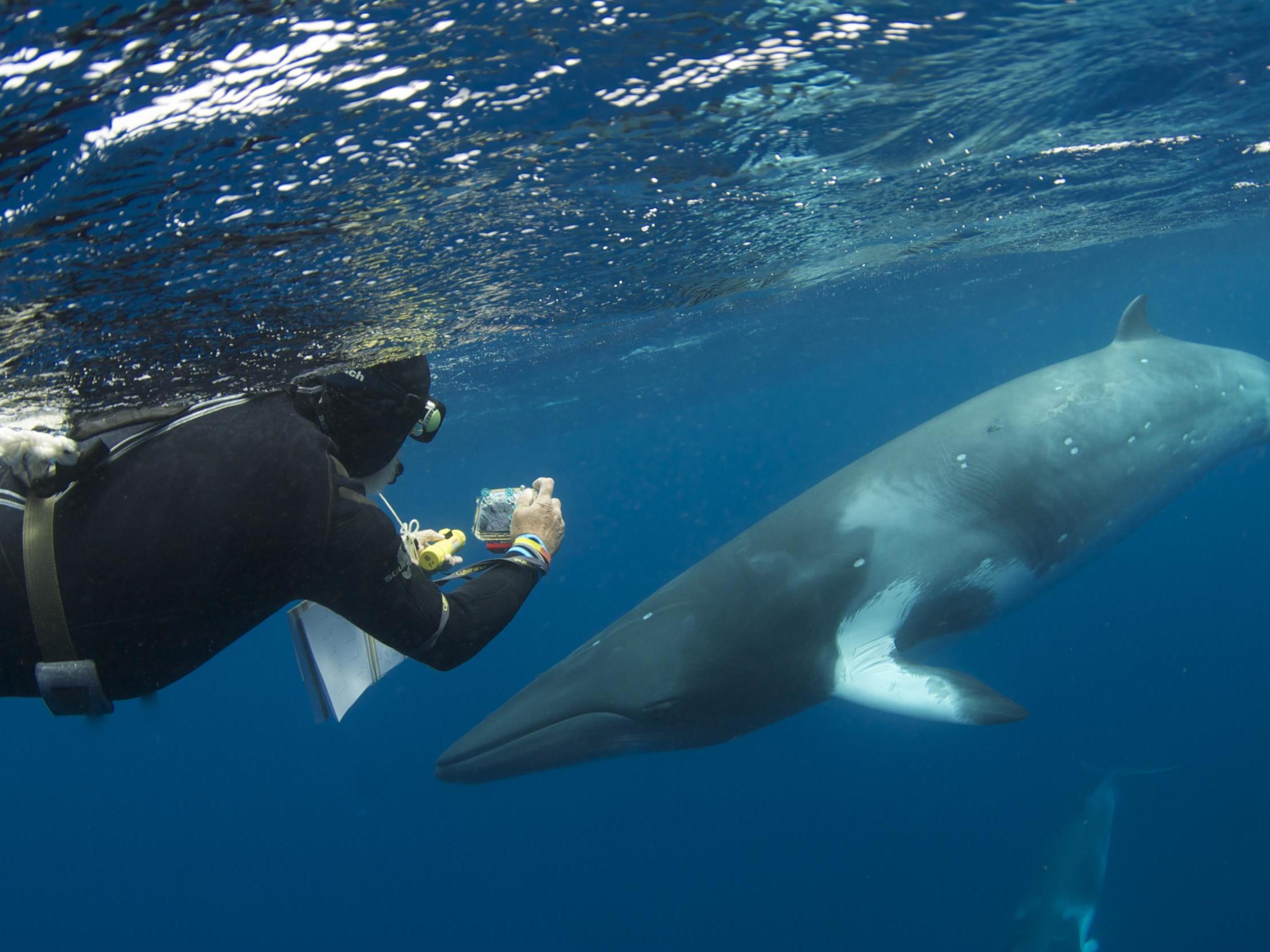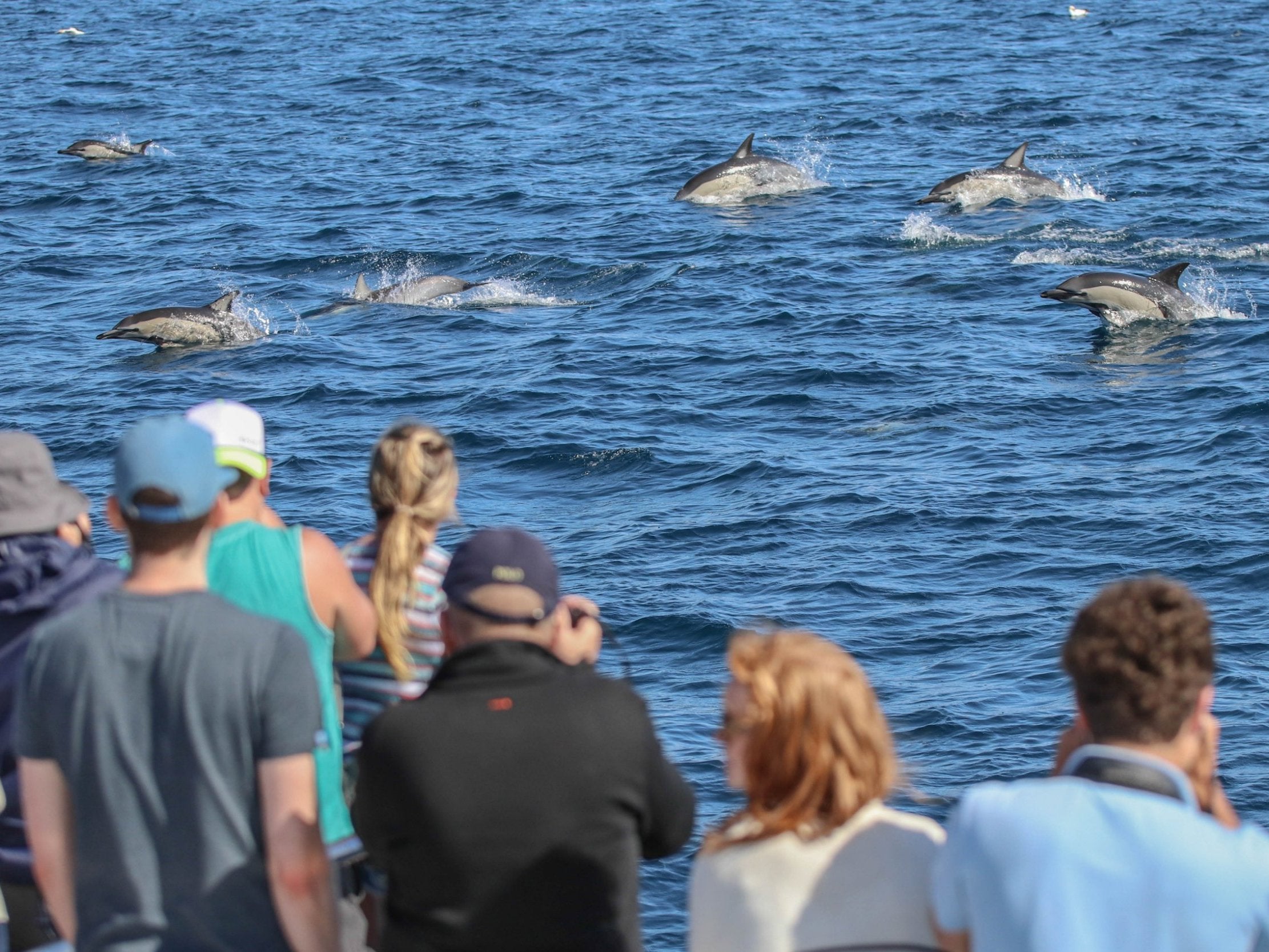Swimming with baby whales and dolphins to be phased out worldwide
'Interacting with marine mammals has a negative effect on the very animals that people love to see', campaigners say

Tour companies are preparing to phase out trips involving swimming with whale and dolphin calves in a drive to crack down on disturbance to the ocean creatures by humans.
Using selfie sticks in the water alongside whales or dolphins will be strongly discouraged, and swimmers will be told to limit their time with the mammals to half an hour.
Under new guidelines, issued by the World Cetacean Alliance, holidaymakers will also be asked to limit the size of their groups, hold on to surface ropes and observe distance restrictions, not getting too close to the mammals.
Alliance campaigners want to curb the “invasive” impact of the multi-million-pound industry of whale and dolphin experiences including boat tours and swimming alongside the creatures.
They are calling on tour operators worldwide, firms that belong to Abta, tourism associations and commercial whale-watching operators to observe its strict new guidelines to help protect marine life.
For swimmers, the new rules mean:
- A maximum of four people swimming with whales, and a maximum of eight swimming with dolphins
- Swimmers must hold on to a surface rope while with a whale or dolphin
- No selfie sticks during encounters
- No swimming with whale calves or nursery groups of dolphins
Swimming with wild whales and dolphins is arguably a more invasive form of tourism than observing from boats, the alliance says, because entering the water can disturb and interrupt the animals’ natural behaviour.
Human interference in the seas can compromise welfare, risk the lives of young and potentially even cause population numbers to fall, the campaigners believe.

For watchers on board boats, the new guidance suggests there should be no more than three vessels within 300m of a whale or dolphin at any one time, and that lone whale calves should not be approached closer than that distance. Encounters should be limited to 30 minutes, it suggests.
Experts at the World Cetacean Alliance, who have spent 18 months consulting whale-watching firms and marine life experts, said they were confident the tour companies involved would follow the guidelines and urged other businesses to follow suit.
Scientists have revealed through various studies that pressure from swimmers getting close to whales can harm the survival of their young, the campaigners claimed.
Calves are particularly vulnerable to disturbance, and tourists getting close to mother and calf pairs can reduce resting and nursing times, increase the risk of predation by separating mothers and calves, and use up the creatures’ vital energy reserves as they try to avoid swimmers and boats.
The alliance says evidence is increasing that interacting with dolphins and whales “has a negative effect on the very animals that people love to see”, arguing the guidelines “will ensure that future whale and dolphin watching trips offer an incredible experience for tourists whilst actively helping to protect whales, dolphins and our oceans through marine conservation initiatives, community education projects, and research”.
Awareness of the need for wild animals to live as close to nature as possible has gradually spread worldwide, with campaigns to boycott SeaWorld taking off.
The alliance, a partnership of conservation charities, scientists and tour firms, says although the guidelines balance the protection of cetaceans with the practicalities of running tour businesses, this is the first time anyone has drawn a line at swimming with baby whales.

Demand for swimming with whales in the wild has accelerated in recent years, thanks in part to natural-history documentaries, creating a boom in “swim-with” and snorkelling tours in tropical waters where whales and dolphins nurse their calves.
The industry is now believed to be worth £1.6bn a year.
Humpback whales live for 50 years or more and travel further than the circumference of the Earth, but calves must first rest, suckle and learn from their mothers for six months, without being disturbed by people in the sea, according to the experts.
Dylan Walker, head of the alliance, said: “We talked to a lot of stakeholders around the world and felt that there was increasing concern for whale calves in particular.
“Sperm whales, for example, often leave their calves alone at the surface to dive deep for food, returning to the surface for only short periods. This means the calves are vulnerable while alone, but they must also maximise the brief time available when their mothers return to them.
“So the disturbance likely during ‘swim-with’ encounters represents too high a risk to the animals.”
He added: “Rather than closing the door to these activities, we have created a comprehensive set of best-practice guidelines to ensure any impacts are minimised. These include some key lessons learnt from best practice whale- and dolphin-watching businesses from across the WCA partnership.”
Sophie Lewis, author of the guidelines, said: “The decision to exclude swim-with baby whales from the guidelines wasn’t taken lightly and the collaboration towards this decision was made with both tour operators and researchers alike.”
“Whales are critical to ocean health,” said Mr Walker. “They reinvigorate ecosystems by bringing food and nutrients to the surface, which even helps our oceans absorb more carbon from the atmosphere so every baby whale is precious.”
Join our commenting forum
Join thought-provoking conversations, follow other Independent readers and see their replies
Comments
Bookmark popover
Removed from bookmarks